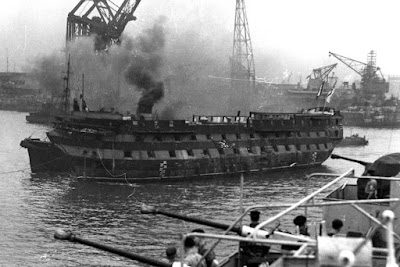23 December 2021: Last week, I mentioned our Christmas tradition is a two part posting and here is the 2nd part. This marvelous poem is clearly the result of someone who has experienced the joy of being at sea in unpleasant winter weather and knows the dangers and discomforts of it. Enjoy!
~~~~~~~~~~~~~
CHRISTMAS AT SEA
Robert Louis Stevenson (1850-1894)
The sheets were frozen hard, and they cut the naked hand;
The decks were like a slide, where a seaman scarce could stand;
The wind was a nor’wester, blowing squally off the sea;
And cliffs and spouting breakers were the only things a-lee.
They heard the surf a-roaring before the break of day’
But ‘twas only with the peep of light we saw how ill we lay.
We tumbled every hand on deck instanter, with a shout,
And we gave her the main tops’l, and stood by to go about.
All day we tacked and tacked between the South head and the North;
All day we hauled the frozen sheets, and got no further forth;
All day was cold as charity, in bitter pain and dread,
For very life and nature we tacked from head to head.
We gave the South a wider berth, for there the tide race roared;
But every tack we made brought the North Head close aboard.
So’s we saw the cliff and houses and the breakers running high,
And the coastguard in his garden, with this glass against his eye.
The frost was on the village roofs as white as ocean foam;
The good red fires were burning bright in every longshore home;
The windows sparkled clear, and the chimneys volleyed out;
And I vow we smelled the victuals as the vessel went about.
The bells upon the church were rung with a mighty jovial cheer;
For it’s just that I should tell you how (of all the days in the year)
This day of our adversity was blessed Christmas morn,
And the house above the coastguard’s was the house where I was born.
O well I saw the pleasant room, the pleasant faces there,
My mother’s silver spectacles, my father’s silver hair;
And well I saw the firelight, like a flight of homely elves,
Go dancing round the china plates that stand upon the shelves.
And well I knew the talk they had, the talk that was of me,
Of the shadow on the household and the son that went to sea;
And O the wicked fool I seemed, in every kind of way,
To be here and hauling frozen ropes on blessed Christmas Day.
They lit the high sea-light, and the dark began to fall.
“All hands to loose t’gallant sails,” I heard the captain call.
“By the Lord, she’ll never stand it,” our first mate, Jackson, cried.
….”It’s one way or the other, Mr. Jackson,” he replied.
She staggered to her bearings, but the sails were new and good,
And the ship smelt up to windward just as though she understood;
As the winter’s day was ending, in the entry of the night,
We cleared the weary headland, and passed below the light.
And they heaved a mighty breath, every soul on board but me,
As they saw her nose again pointing handsome out to sea;
But all that I could think of, in the darkness and the cold,
Was just that I was leaving home and my folks were growing old.
~~~~~~~~~~~~~~~~~~~~
And with that stirring bit of doggerel, we want to wish all of you a most joyous holiday season and hope you stay safe and warm!
Until next time!
Fair Winds,
Old Salt







